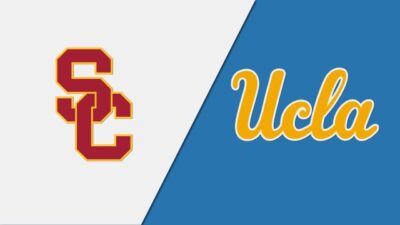Thuc Nhi Nguyen (LA Times) — The only thing more chaotic than Pac-12 after dark is the Pac-12 after tiebreakers.
With two weeks remaining in the regular season, the Pac-12 Conference race remains wide open. Five teams — USC, UCLA, Oregon, Utah and Washington — could still land in a five-way tie for two spots in the conference championship game.
Here’s what to know about how UCLA and USC can claim a ticket to the title game Dec. 2 at Allegiant Stadium in Las Vegas:
USC (9-1, 7-1 Pac-12) has the most direct path: Win and the Trojans are in. USC can clinch its spot in the Pac-12 championship game with a victory over rival UCLA on Saturday night. The Trojans would likely face the winner of Saturday’s Utah-Oregon game for the title Dec. 2.
A win would not only cement USC’s place in its fourth Pac-12 championship game, but it also would eliminate UCLA from contention. After last week’s loss to Arizona, the Bruins (8-2, 5-2) need help to play in the title game for a shot at their first conference crown since 1998.
UCLA first needs wins over USC and California. Then the Bruins want Washington to lose at least once to Colorado or Washington State. No matter who wins between Utah (8-2, 6-1) and host Oregon (8-2, 6-1) on Saturday night, UCLA still has a chance because of the Pac-12’s complicated tiebreakers.
The tiebreaker order differs for two-team ties and multiteam ties. After head-to-head wins if the teams have played each other, the tiebreaking procedure in a two-team tie is each team’s win percentage against the next highest-placed common opponent in the standings. But in a multiteam tie, the next step if the teams haven’t all played each other is win percentage against all common conference opponents.
This can be important for UCLA because of its loss to Arizona. The Wildcats are a common opponent among all five teams in contention and the Bruins are the only contender to lose to them, putting UCLA at a disadvantage in several multiteam tiebreakers that feature teams that haven’t all played one another.
For example, UCLA, Washington and USC could be tied for second place at 7-2 behind an 8-1 Utah or Oregon. Even though UCLA would have beaten USC, the Trojans, who did not play Washington this year, would still win the three-team tiebreaker because they went 5-0 against common opponents among the three tied teams — Stanford, Arizona, Colorado, California and Arizona State — while UCLA lost to the Wildcats and the Huskies lost to Arizona State.
UCLA can survive a multiteam tiebreaker that includes Utah or Oregon, but not both. Having both teams at 7-2 along with USC, which didn’t play Oregon, would invoke the common opponents tiebreaker. In a tie among UCLA, USC and Utah, the Bruins can advance on head-to-head wins, and in a tie among Oregon, USC and UCLA, because USC and Oregon didn’t play each other and each team lost once to common opponents, the Bruins can fall back on their win over Utah, the next highest-placed common opponent, which is the third-tier multiteam tiebreaker.
Meanwhile, USC can consider itself lucky. The goal is simple in Heritage Hall.
Just win.
TrojanDailyBlog members — Always feel free to add information or new topics to the TDB which don’t necessarily pertain to any particular moderator post or member comment.

